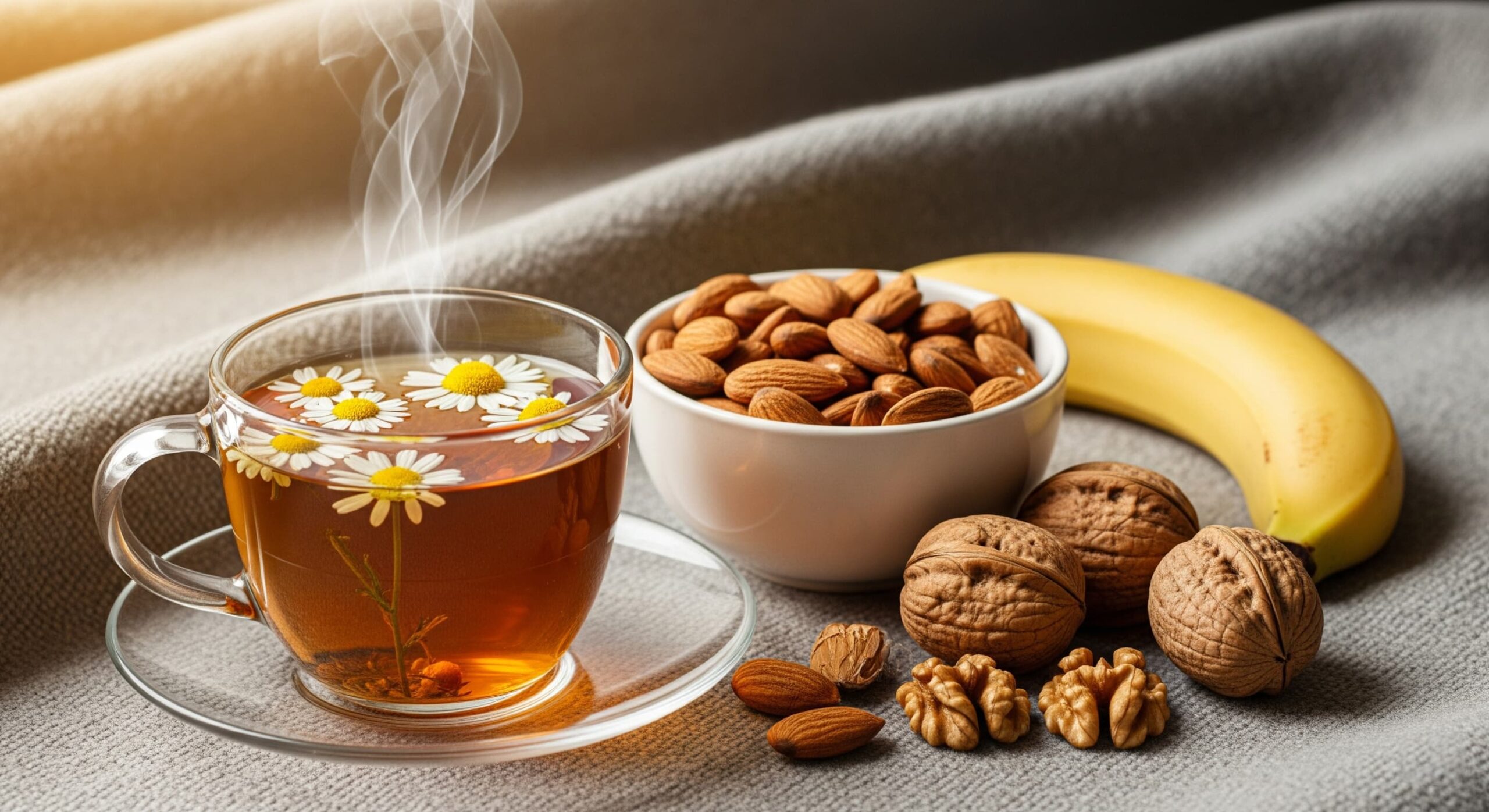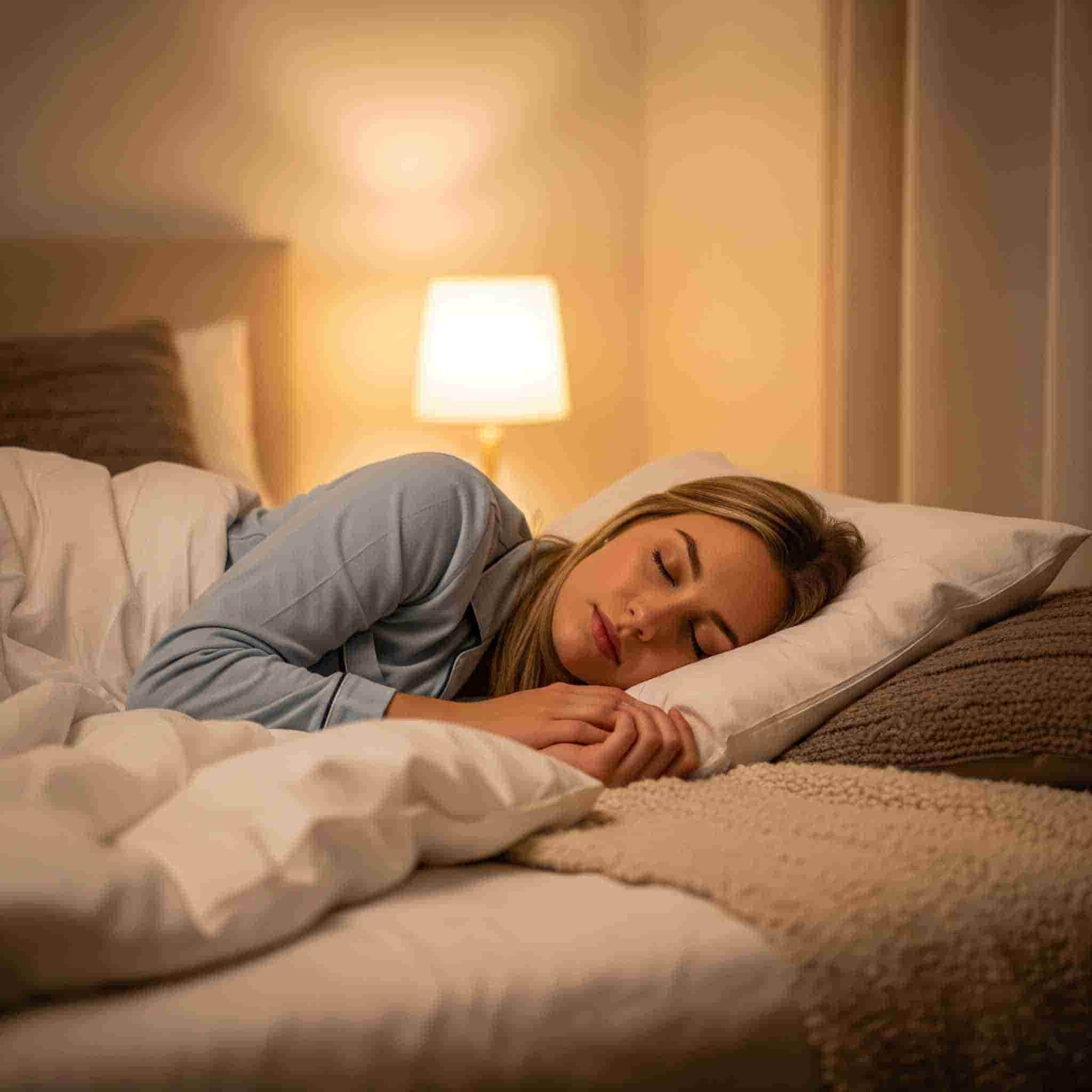In our quest for better sleep, many of us turn to prescription medications or over-the-counter sleep aids. However, nature has provided us with a wealth of gentle, effective alternatives that can promote restful sleep without the side effects or dependency risks associated with pharmaceutical options. From specific foods that naturally boost melatonin production to time-tested herbs that calm the nervous system, natural sleep aids offer a holistic approach to improving your sleep quality. This comprehensive guide explores the science behind natural sleep promotion and provides practical strategies for incorporating these powerful allies into your nightly routine.
The Science of Natural Sleep Support
Understanding how natural sleep aids work can help you make informed choices about which options might be most beneficial for your specific sleep challenges.
How Natural Sleep Aids Work
Natural sleep aids support your body's existing sleep mechanisms rather than forcing sleep through chemical intervention. They work through several pathways:
- Neurotransmitter Support: Many natural compounds help increase levels of sleep-promoting neurotransmitters like GABA, serotonin, and melatonin
- Nervous System Calming: Herbs and nutrients can activate the parasympathetic nervous system, promoting relaxation and reducing stress hormones
- Circadian Rhythm Regulation: Certain foods and supplements help maintain your body's natural sleep-wake cycle
- Muscle Relaxation: Some natural compounds help relieve physical tension that can interfere with sleep
- Digestive Support: Proper nutrition timing and specific foods can optimize digestion for better sleep
Advantages of Natural Approaches
- Gentle Action: Work with your body's natural processes rather than overriding them
- Minimal Side Effects: Generally well-tolerated with fewer adverse reactions
- No Dependency Risk: Can be used long-term without developing tolerance or addiction
- Additional Health Benefits: Many natural sleep aids provide other health benefits beyond sleep improvement
- Holistic Approach: Address underlying causes of sleep issues rather than just symptoms
- Cost-Effective: Often more affordable than prescription medications
Important Considerations
While natural sleep aids are generally safe, it's important to approach them thoughtfully:
- Individual Variation: What works for one person may not work for another—experimentation may be needed
- Quality Matters: Choose high-quality, reputable sources for herbs and supplements
- Timing is Key: Many natural sleep aids work best when taken at specific times
- Gradual Effects: Natural approaches often take time to show full benefits—be patient
- Consult Healthcare Providers: Especially if you're taking medications or have health conditions
Sleep-Promoting Foods
Certain foods contain natural compounds that can help prepare your body for sleep. Incorporating these into your evening routine can significantly improve your sleep quality.
Tart Cherry Juice
One of the most researched natural sleep aids, tart cherry juice is a natural source of melatonin.
The Science: Studies show that drinking tart cherry juice can increase sleep time by up to 84 minutes and improve sleep efficiency by 5-6%.
How to Use:
- Drink 8 oz of tart cherry juice 1-2 hours before bedtime
- Look for 100% tart cherry juice without added sugars
- Can also be consumed as dried tart cherries (1/4 cup)
- Best results seen with consistent daily use
Additional Benefits: Anti-inflammatory properties, antioxidant support, may help with exercise recovery.
Kiwi Fruit
This small fruit packs a powerful sleep-promoting punch with its unique combination of nutrients.
The Science: Research shows that eating 2 kiwis one hour before bedtime can improve sleep onset, duration, and efficiency.
Active Compounds:
- Serotonin: Helps regulate sleep-wake cycles
- Antioxidants: May reduce inflammation that interferes with sleep
- Folate: Deficiency linked to insomnia
- Vitamin C: Supports overall health and stress reduction
How to Use: Eat 1-2 medium kiwis 30-60 minutes before bedtime for optimal results.
Nuts and Seeds
Several nuts and seeds contain compounds that naturally promote sleep.
Almonds:
- Rich in magnesium, which helps relax muscles and calm the nervous system
- Contain tryptophan and melatonin
- Recommended serving: 1 oz (about 23 almonds) 1-2 hours before bed
Walnuts:
- Natural source of melatonin
- Contain healthy omega-3 fatty acids
- May help improve sleep quality and duration
Pumpkin Seeds:
- High in magnesium and zinc
- Contain tryptophan
- Support overall sleep architecture
Foods Rich in Tryptophan
Tryptophan is an amino acid that your body converts to serotonin and then to melatonin.
Top Tryptophan Sources:
- Turkey: The classic sleep-inducing food, especially effective when combined with carbohydrates
- Milk: Contains both tryptophan and calcium, which helps the brain use tryptophan
- Eggs: High-quality protein with significant tryptophan content
- Cheese: Particularly cottage cheese, which is high in casein protein
- Salmon: Combines tryptophan with omega-3 fatty acids
- Tofu and Soy Products: Excellent plant-based tryptophan sources
Optimization Tip: Combine tryptophan-rich foods with complex carbohydrates to enhance tryptophan's ability to cross the blood-brain barrier.
Fatty Fish
Fish high in omega-3 fatty acids can significantly improve sleep quality.
Best Options:
- Salmon: High in both omega-3s and vitamin D
- Tuna: Rich in tryptophan and omega-3s
- Mackerel: Excellent source of healthy fats
- Sardines: Affordable option with high nutrient density
The Science: Studies show that people who eat fish regularly fall asleep faster and experience better sleep quality.
How to Use: Include fatty fish in your dinner 2-3 times per week, ideally 3-4 hours before bedtime.
Complex Carbohydrates
The right carbohydrates can help promote sleep by supporting serotonin production.
Sleep-Friendly Carbs:
- Oatmeal: Contains melatonin and complex carbs that promote serotonin
- Whole Grain Bread: Helps tryptophan reach the brain more effectively
- Brown Rice: High glycemic index helps with tryptophan uptake
- Quinoa: Complete protein with sleep-supporting amino acids
- Sweet Potatoes: Contain potassium and complex carbs
Timing: Consume complex carbohydrates 2-3 hours before bedtime for optimal effect.
Herbal Sleep Aids
Traditional herbs have been used for centuries to promote relaxation and sleep. Modern research has validated many of these time-tested remedies.
Chamomile
Perhaps the most well-known sleep herb, chamomile has been used for centuries as a gentle sleep aid.
Active Compound: Apigenin, which binds to benzodiazepine receptors in the brain, promoting relaxation.
Research: Studies show chamomile can improve sleep quality and reduce the time it takes to fall asleep.
How to Use:
- Tea: Steep 1-2 teaspoons of dried chamomile in hot water for 10-15 minutes
- Supplement: 400-1600mg of chamomile extract 30-60 minutes before bed
- Timing: Best consumed 30-45 minutes before desired sleep time
Safety: Generally very safe, but those allergic to ragweed should use caution.
Valerian Root
One of the most studied herbal sleep aids, valerian root has been used for over 2,000 years.
How It Works: Increases GABA levels in the brain, promoting relaxation and reducing anxiety.
Research: Multiple studies show valerian can improve sleep quality and reduce sleep latency.
Dosage and Use:
- Standardized Extract: 300-600mg taken 30 minutes to 2 hours before bed
- Tea: 2-3 grams of dried root steeped for 10-15 minutes
- Tincture: 1-1.5 teaspoons before bedtime
Important Notes: May take 2-4 weeks of consistent use to see full benefits. Some people may experience vivid dreams.
Passionflower
This beautiful flowering plant is a powerful ally for both anxiety and sleep issues.
Benefits:
- Reduces anxiety and mental restlessness
- Improves sleep quality without morning grogginess
- Helps with racing thoughts at bedtime
- May enhance the effects of other sleep herbs
How to Use:
- Tea: 1 teaspoon of dried herb per cup of water
- Extract: 45 drops of liquid extract or 90mg of standardized extract
- Timing: 30-60 minutes before bedtime
Research: Studies show passionflower tea can improve sleep quality as effectively as some prescription sleep aids.
Lavender
Known for its calming scent, lavender is effective both as aromatherapy and when taken internally.
Multiple Applications:
- Aromatherapy: Inhaling lavender essential oil can reduce anxiety and improve sleep
- Oral Supplements: Lavender oil capsules have shown effectiveness in clinical trials
- Tea: Dried lavender flowers make a soothing bedtime tea
- Topical: Lavender oil can be applied to pulse points or added to a bath
Dosage:
- Essential Oil: 2-3 drops on pillow or in diffuser
- Oral Supplement: 80-160mg of lavender oil extract
- Tea: 1-2 teaspoons of dried flowers per cup
Lemon Balm
A member of the mint family, lemon balm is particularly effective for stress-related sleep issues.
Benefits:
- Reduces stress and anxiety
- Promotes calm alertness during the day and restful sleep at night
- May help with digestive issues that interfere with sleep
- Combines well with other calming herbs
How to Use:
- Tea: 1.5-4.5 grams of dried herb per cup
- Extract: 300-500mg of standardized extract
- Fresh Herb: Can be added to salads or used in cooking
Combination Tip: Works particularly well when combined with chamomile or passionflower.
Natural Sleep Supplements
Certain vitamins, minerals, and natural compounds can provide targeted support for better sleep.
Melatonin
The body's natural sleep hormone, available as a supplement for those who need additional support.
When It's Helpful:
- Jet lag and shift work
- Delayed sleep phase syndrome
- Age-related melatonin decline
- Seasonal affective disorder
Dosage Guidelines:
- Sleep Onset: 0.5-3mg taken 30 minutes before desired bedtime
- Jet Lag: 0.5-5mg at the destination's bedtime
- Start Low: Begin with the lowest effective dose
Important Notes: More is not always better with melatonin. Higher doses can actually disrupt sleep patterns.
Magnesium
This essential mineral plays a crucial role in sleep regulation and muscle relaxation.
How It Helps Sleep:
- Activates the parasympathetic nervous system
- Regulates melatonin production
- Binds to GABA receptors, promoting relaxation
- Reduces cortisol levels
- Relaxes muscles and reduces physical tension
Best Forms for Sleep:
- Magnesium Glycinate: Highly absorbable and calming
- Magnesium Threonate: Crosses the blood-brain barrier effectively
- Magnesium Citrate: Good absorption, may have mild laxative effect
Dosage: 200-400mg taken 30-60 minutes before bedtime.
L-Theanine
An amino acid found in tea leaves that promotes relaxation without sedation.
Unique Benefits:
- Promotes relaxation while maintaining alertness
- Reduces anxiety without drowsiness
- Improves sleep quality without affecting sleep architecture
- May help with racing thoughts
How It Works: Increases alpha brain waves associated with relaxed awareness and boosts GABA, serotonin, and dopamine levels.
Dosage: 100-200mg taken 30-60 minutes before bedtime, or 200-400mg for higher stress levels.
Timing Options: Can be taken during the day for stress management or at night for sleep support.
GABA
The brain's primary inhibitory neurotransmitter, responsible for calming neural activity.
Role in Sleep:
- Reduces neural excitability
- Promotes feelings of calm and relaxation
- Helps quiet racing thoughts
- Supports the transition from wakefulness to sleep
Supplementation:
- Dosage: 500-750mg taken 30-60 minutes before bed
- Absorption: May be enhanced when taken on an empty stomach
- Combination: Often more effective when combined with other calming nutrients
Note: Some debate exists about GABA's ability to cross the blood-brain barrier, but many users report benefits.
5-HTP (5-Hydroxytryptophan)
A precursor to serotonin that can help improve both mood and sleep.
Benefits for Sleep:
- Increases serotonin production
- Supports natural melatonin synthesis
- May improve sleep quality and duration
- Helps with mood-related sleep issues
Dosage: 50-100mg taken 30-45 minutes before bedtime, preferably on an empty stomach.
Important: Should not be combined with antidepressants without medical supervision.
Creating Your Natural Sleep Routine
The key to success with natural sleep aids is creating a consistent, personalized routine that works with your lifestyle and sleep challenges.
Building Your Evening Routine
3-4 Hours Before Bed:
- Finish your last large meal
- Include sleep-promoting foods in dinner (fatty fish, complex carbs)
- Begin reducing caffeine and stimulating activities
2-3 Hours Before Bed:
- Have a light snack if needed (nuts, kiwi, or tart cherries)
- Take longer-acting supplements like valerian root
- Begin dimming lights and reducing screen time
1 Hour Before Bed:
- Prepare and drink herbal tea (chamomile, passionflower)
- Take faster-acting supplements (melatonin, magnesium)
- Begin relaxation activities (reading, gentle stretching)
30 Minutes Before Bed:
- Use aromatherapy (lavender essential oil)
- Practice relaxation techniques
- Ensure your sleep environment is optimized
Personalizing Your Approach
For Stress-Related Sleep Issues:
- Focus on adaptogenic herbs and stress-reducing nutrients
- Emphasize magnesium, L-theanine, and passionflower
- Include stress-management practices throughout the day
For Racing Thoughts:
- Try GABA, L-theanine, or lemon balm
- Practice meditation or journaling before bed
- Use aromatherapy to create a calming environment
For Physical Tension:
- Emphasize magnesium and muscle-relaxing herbs
- Include gentle stretching or yoga in your routine
- Consider a warm bath with Epsom salts
For Circadian Rhythm Issues:
- Use melatonin strategically
- Focus on light exposure timing during the day
- Maintain consistent sleep and wake times
Combining Natural Sleep Aids
Effective Combinations:
- Chamomile + Magnesium: Gentle relaxation and muscle tension relief
- Valerian + Passionflower: Powerful combination for anxiety-related insomnia
- L-Theanine + Melatonin: Relaxation without grogginess plus sleep timing support
- Tart Cherry Juice + Magnesium: Natural melatonin boost plus muscle relaxation
Safety Guidelines:
- Start with one supplement at a time to assess individual effects
- Begin with lower doses and gradually increase if needed
- Allow 2-4 weeks to evaluate effectiveness
- Keep a sleep diary to track what works best
- Consult healthcare providers before combining multiple supplements
Foods and Substances to Avoid
Just as important as what you include in your diet is what you avoid, especially in the hours leading up to bedtime.
Sleep-Disrupting Foods and Drinks
Caffeine Sources:
- Coffee: Avoid after 2 PM (or 6-8 hours before bedtime)
- Tea: Even green tea contains caffeine—switch to herbal teas in the evening
- Chocolate: Dark chocolate especially contains caffeine and theobromine
- Energy Drinks: High caffeine content plus other stimulants
- Some Medications: Check labels for caffeine content
Alcohol:
- While initially sedating, alcohol disrupts sleep architecture
- Reduces REM sleep and causes frequent awakenings
- Can lead to rebound insomnia as it metabolizes
- If consuming alcohol, finish at least 3 hours before bedtime
Heavy or Spicy Foods:
- Can cause indigestion and discomfort
- May raise body temperature, interfering with sleep
- Require significant energy for digestion
- Finish large meals at least 3-4 hours before bed
Timing Considerations
Fluid Intake:
- Reduce fluid intake 2-3 hours before bedtime to minimize nighttime awakenings
- Stay well-hydrated during the day to avoid evening thirst
- If taking herbal teas, finish them at least 1 hour before bed
Sugar and Refined Carbs:
- Can cause blood sugar spikes and crashes
- May lead to middle-of-the-night awakenings
- Choose complex carbohydrates instead for stable blood sugar
Your Natural Path to Better Sleep
Natural sleep aids offer a gentle, effective approach to improving your sleep quality without the risks associated with pharmaceutical options. From the melatonin-rich tart cherries to the calming effects of chamomile tea, nature provides numerous tools to help you achieve the restful sleep your body needs.
Remember: The key to success with natural sleep aids is consistency and patience. Unlike prescription medications that work immediately, natural approaches often take time to build up in your system and show their full benefits.
Start simple: Begin with one or two natural sleep aids that appeal to you, whether it's a cup of chamomile tea or a handful of almonds before bed. Pay attention to how your body responds and gradually build your personalized sleep routine.
Quality matters: Choose high-quality, organic sources when possible, and always consult with healthcare providers if you have underlying health conditions or take medications.
Holistic approach: Remember that natural sleep aids work best as part of a comprehensive approach that includes good sleep hygiene, stress management, and a healthy lifestyle.
Sweet dreams are within reach—let nature be your guide to the restful sleep you deserve.


